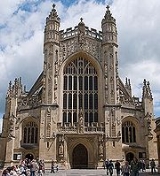
List of former cathedrals in the United Kingdom
Encyclopedia
See also List of former cathedrals in England, Wales and the Isle of Man.
This is a list of former or intended cathedrals in the United Kingdom
.
church's current use or its use prior to deconsecration
.
This is a list of former or intended cathedrals in the United Kingdom
United Kingdom
The United Kingdom of Great Britain and Northern IrelandIn the United Kingdom and Dependencies, other languages have been officially recognised as legitimate autochthonous languages under the European Charter for Regional or Minority Languages...
.
England
References in this section are to the EnglishEngland
England is a country that is part of the United Kingdom. It shares land borders with Scotland to the north and Wales to the west; the Irish Sea is to the north west, the Celtic Sea to the south west, with the North Sea to the east and the English Channel to the south separating it from continental...
church's current use or its use prior to deconsecration
Deconsecration
Deconsecration is the act of removing a religious blessing from something that had been previously consecrated by a minister or priest of that religion. The same act when performed by a member of a differing religion may be considered a curse by some religions and not a complete removal of the...
.
Pre-Reformation and Post-Reformation Anglican
| Image | Name and dedication | Diocese | Cathedral/website |
|---|---|---|---|
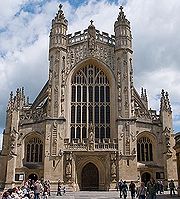 |
Bath Bath Abbey The Abbey Church of Saint Peter and Saint Paul, Bath, commonly known as Bath Abbey, is an Anglican parish church and a former Benedictine monastery in Bath, Somerset, England... Church of Ss Peter and Paul |
Diocese of Bath and Wells Diocese of Bath and Wells The Diocese of Bath and Wells is a diocese in the Church of England Province of Canterbury in England.The diocese covers the county of Somerset and a small area of Dorset. The Episcopal seat of the Bishop of Bath and Wells is located in the Cathedral Church of Saint Andrew in the tiny city of... |
1090 |
| translated from Wells 1090 joint with Glastonbury 1192 co-cathedral with Wells 1218Current status: parish church |
51.381458°N 2.358775°W http://www.bathabbey.org/ | ||
 |
Bradwell-on-Sea Church of St Peter-on-the-Wall |
645–664 | |
| Described as a Saxon cathedral in the guide book. chapel for the Othona Community |
51.735323°N 0.939876°W http://www.bradwellchapel.org/ | ||
 |
Chester Church of St John the Baptist |
1072/1075–1102 | |
| secular canons c. 906– c. 1547 Cathedral 1075–1102 Current status: parish church |
53.189013°N 2.885706°Whttp://www.bwpics.co.uk/stjohn.html | ||
| Chester-le-Street Church |
875–995 | ||
| location unknown | |||
| Coventry Cathedral and Priory of St Mary |
1095–1539 | ||
| Benedictine priory | 52.409280°N 1.508008°W | ||
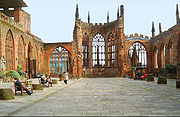 |
Coventry Cathedral Coventry Cathedral Coventry Cathedral, also known as St Michael's Cathedral, is the seat of the Bishop of Coventry and the Diocese of Coventry, in Coventry, West Midlands, England. The current bishop is the Right Revd Christopher Cocksworth.... Cathedral Church of St Michael |
Diocese of Coventry Diocese of Coventry The Diocese of Coventry is a Church of England diocese in the Province of Canterbury. It is headed by the Bishop of Coventry, who sits at Coventry Cathedral in Coventry, and is assisted by one suffragan bishop, the Bishop of Warwick. The diocese covers Coventry and Warwickshire.The diocese is... |
1918–1940 |
| former parish church, destroyed during World War II World War II World War II, or the Second World War , was a global conflict lasting from 1939 to 1945, involving most of the world's nations—including all of the great powers—eventually forming two opposing military alliances: the Allies and the Axis... new cathedral built adjoining ruins |
52.407955°N 1.507385°W | ||
 |
Crediton Parish Church Crediton Parish Church The Church of the Holy Cross and the Mother of Him who hung thereon is a prominent building and worshipping community in the Devon town of Crediton. The church was the cathedral of the Lord Bishop of Crediton in the former diocese until 1050 when the See was transferred to Exeter... Church of the Holy Cross and the Mother of Him who hung thereon |
Diocese of Exeter Diocese of Exeter The Diocese of Exeter is a Church of England diocese covering the county of Devon. It is one of the largest dioceses in England. The Cathedral Church of Saint Peter in Exeter is the seat of the diocesan bishop, the Right Reverend Michael Langrish, Bishop of Exeter. It is part of the Province of... |
909–1050 |
| translated to Exeter 1050 collegiate church 1050–1547 Current status: parish church |
http://www.creditonparishchurch.org.uk/ | ||
| Establishment | | Image | | Dedication | | Established | | Notes/provenance | | Location and website |
|---|---|---|---|---|---|
| Domnoc (Dunwich) | 630–673 | translated from Soham; a number of locations have been suggested, possibly now under the sea due to coastal erosion translated to North Elmham 673 |
|||
| Dorchester Dorchester Abbey Dorchester Abbey is a Church of England parish church in Dorchester on Thames, Oxfordshire, about southeast of Oxford. It was formerly a Norman abbey church and was built on the site of a Saxon cathedral.-History:... |
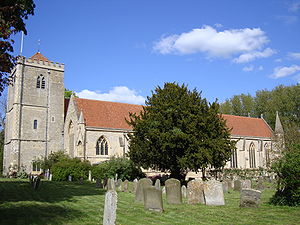 |
St Peter, St Paul and St Birinius | 634–1072/1092 | translated to Lincoln 1072/1092? secular canons 634–1140 Augustinian priory 1140–1536 now a parish church |
51.643631°N 1.164202°W |
| Douglas | The Parish Church of St George | until 1980 | pro-cathedral (acting cathedral) | ||
| Fountains Fountains Abbey Fountains Abbey is near to Aldfield, approximately two miles southwest of Ripon in North Yorkshire, England. It is a ruined Cistercian monastery, founded in 1132. Fountains Abbey is one of the largest and best preserved Cistercian houses in England. It is a Grade I listed building and owned by the... |
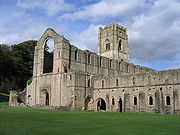 |
1537–1550 | after dissolution the site was ear-marked for the establishment of a cathedral for a new Dales bishopric. Ultimately St Werburgh's Church in Chester Chester Cathedral Chester Cathedral is the mother church of the Church of England Diocese of Chester, and is located in the city of Chester, Cheshire, England. The cathedral, formerly St Werburgh's abbey church of a Benedictine monastery, is dedicated to Christ and the Blessed Virgin Mary... was raised to cathedral status instead. |
54.109874°N 1.581312°W | |
| Glastonbury Glastonbury Abbey Glastonbury Abbey was a monastery in Glastonbury, Somerset, England. The ruins are now a grade I listed building, and a Scheduled Ancient Monument and are open as a visitor attraction.... |
51.145648°N 2.715318°W | ||||
| Guildford Holy Trinity Church, Guildford Holy Trinity Church is an Anglican church in the centre of Guildford, England. A large, red brick building, it was built on the site of a mediaeval church which collapsed in the mid-18th century... |
 |
The Holy Trinity | 1927–1962 | acted as pro-cathedral from the creation of the new Anglican Diocese of Guildford Diocese of Guildford The Diocese of Guildford is a Church of England diocese based in Guildford, covering most of Surrey and part of Hampshire. The cathedral is Guildford Cathedral and the bishop is the Bishop of Guildford. It is part of the Province of Canterbury.... until the dedication of the new Guildford Cathedral Guildford Cathedral The Cathedral Church of the Holy Spirit, Guildford is the Anglican cathedral at Guildford, Surrey, England.-Construction:Guildford was made a diocese in its own right in 1927, and work on its new cathedral, designed by Sir Edward Maufe, began nine years later, with the foundation stone being laid... |
51.235929°N 0.570753°W |
| Hexham Hexham Abbey Hexham Abbey is a place of Christian worship dedicated to St Andrew and located in the town of Hexham, Northumberland, in northeast England. Since the Dissolution of the Monasteries in 1537, the Abbey has been the parish church of Hexham.-History:... |
 |
St Andrew | 681–821 | Augustinian abbey 1113–1537 | 54.971494°N 2.102787°W |
| Hoxne Hoxne Priory Hoxne Priory was a Benedictine priory at Hoxne in Suffolk, England.It was founded as a religious house around the year 950, with a chapel at the supposed site of the martyrdom of Saint Edmund, king of East Anglia. The chapel was given in 1101 to Norwich Cathedral by Herbert de Losinga, and the... |
early 10th century | became subordinate to North Elmham, then Thetford | |||
| Kirkmichael | The Chapel of Bishopscourt Palace | prior to 1980 | bishop's seat | ||
| Leicester | 679–874 | location unknown, possibly now occupied by a parish church | |||
| Lindisfarne Lindisfarne Lindisfarne is a tidal island off the north-east coast of England. It is also known as Holy Island and constitutes a civil parish in Northumberland... |
635–875 | location unknown (pre-dates priory ruins) | |||
| Lindsey (Sidnacester) | c. 680–c. 875 | united with Dorchester | |||
| Madeley Heath | St Mary and St John John the Apostle John the Apostle, John the Apostle, John the Apostle, (Aramaic Yoħanna, (c. 6 - c. 100) was one of the Twelve Apostles of Jesus. He was the son of Zebedee and Salome, and brother of James, another of the Twelve Apostles... |
Holy Catholic Church (Anglican Rite) pro-cathedral translated to Our Lady of Grace cathedral in Stoke-on-Trent Stoke-on-Trent Stoke-on-Trent , also called The Potteries is a city in Staffordshire, England, which forms a linear conurbation almost 12 miles long, with an area of . Together with the Borough of Newcastle-under-Lyme Stoke forms The Potteries Urban Area... |
|||
| Middlesbrough | Our Lady of Perpetual Help | 1878–1983 | Roman Catholic see translated to Coulby Newham in 1983; former site redeveloped following the demolition of the building after damage from an arson attack 30 May 2000 |
54.580127°N 1.236844°W | |
| North Elmham North Elmham North Elmham is a village and civil parish in the English county of Norfolk.It covers an area of and had a population of 1,428 in 624 households as of the 2001 census. For the purposes of local government, it falls within the district of Breckland.... |
673–1070 | translated from Domnoc 673 translated to Thetford 1070 remains on site of earlier Saxon establishment |
52.755532°N 0.944712°W | ||
| Old Sarum Old Sarum Cathedral Old Sarum Cathedral was a Norman cathedral built at Old Sarum, near modern day Salisbury, Wiltshire.After the Norman conquest of England in 1066, William the Conqueror used Old Sarum as a base of operations. William moved the bishopric from the Anglo-Saxon Sherborne Cathedral to Old Sarum,... |
 |
1075–1227 | see moved from Sherborne 1075; translated to Salisbury (New Sarum) 1227 | 51.094278°N 1.806403°W | |
| Osney Osney Abbey Osney Abbey or Oseney Abbey, later Osney Cathedral, was a house of Augustinian canons at Osney in Oxfordshire. The site is south of the modern Botley Road, down Mill Street by Osney Cemetery, next to the railway line just south of Oxford station. It was founded as a priory in 1129, becoming an... (Oseney) |
1542–1546 | priory; see Episcopal See An episcopal see is, in the original sense, the official seat of a bishop. This seat, which is also referred to as the bishop's cathedra, is placed in the bishop's principal church, which is therefore called the bishop's cathedral... moved to Oxford 1546 |
|||
| Peel Peel Castle thumb|250px|right|Chancel of the Cathedral of St. GermanPeel Castle is a castle in Peel, Isle of Man originally constructed by Vikings. The castle stands on St Patrick's Isle which is connected to the town by causeway... |
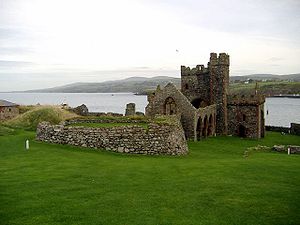 |
St Germanus | 447–1980 | ruin on St Patrick’s Isle, replaced by former Parish Church | |
| Ramsbury | 909–1058 | translated to Sarum 1075 site now occupied by newer church |
|||
| St Germans St German's Priory St German's Priory is a large Norman church in the village of St Germans in south-east Cornwall, in the United Kingdom.-History:According to a credible tradition the church here was founded by St Germanus himself ca. 430 AD. The first written record however is of Conan being made Bishop in the... |
 |
St Germanus | c. 936–1042 | Augustinian priory c. 1184–1539 | 50.396686°N 4.309699°W |
| Selsey | St Wilfred | 680-1080 | translated to Chichester 1080 site probably now submerged, other sources suggest church at Church Norton is the site. Mr Wilmot a well know source of information has also suggested Chichester Cathedral could have been moved |
50.754907°N 0.765173°W | |
| Sherborne Sherborne Abbey The Abbey Church of St Mary the Virgin at Sherborne in the English county of Dorset, is usually called Sherborne Abbey. It has been a Saxon cathedral , a Benedictine abbey and is now a parish church.- Cathedral :... |
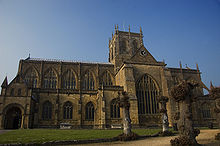 |
St Mary the Virgin | 705-1075 | suppressed 1058 united with Ramsbury see moved to Sarum 1075 Benedictine Benedictine Benedictine refers to the spirituality and consecrated life in accordance with the Rule of St Benedict, written by Benedict of Nursia in the sixth century for the cenobitic communities he founded in central Italy. The most notable of these is Monte Cassino, the first monastery founded by Benedict... abbey Abbey An abbey is a Catholic monastery or convent, under the authority of an Abbot or an Abbess, who serves as the spiritual father or mother of the community.The term can also refer to an establishment which has long ceased to function as an abbey,... 1122-1539 |
50.946693°N 0.2516781°W |
| Southend-on-Sea | St Erkenwald | built 1905, considered for elevation to cathedral status, but ultimately left in disrepair and demolished 1995. http://www.st-erkenwalds.co.uk | 51.536796°N 0.724218°W | ||
| Soham | c.630 | founded by Felix of Burgundy, built by Luttingus; translated to Dunwich c.630 |
|||
| Thetford | 1075–1091 | translated from North Elmham 1075 translated to Norwich 1091 location unknown |
|||
| Waltham Waltham Abbey (abbey) The Abbey Church of Waltham Abbey has been a place of worship since at least 1030, and is in the town of Waltham Abbey, Essex, England. The Prime Meridian passes through its grounds. Harold Godwinson is said to be buried just outside the present abbey... |
 |
1550s | proposed as Cathedral by King Henry VIII | ||
| Westminster Westminster Abbey The Collegiate Church of St Peter at Westminster, popularly known as Westminster Abbey, is a large, mainly Gothic church, in the City of Westminster, London, United Kingdom, located just to the west of the Palace of Westminster. It is the traditional place of coronation and burial site for English,... |
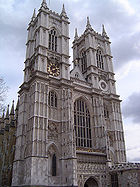 |
The Cathedral and Abbey Church of St Peter | 1540–1550 | Benedictine Benedictine Benedictine refers to the spirituality and consecrated life in accordance with the Rule of St Benedict, written by Benedict of Nursia in the sixth century for the cenobitic communities he founded in central Italy. The most notable of these is Monte Cassino, the first monastery founded by Benedict... abbey Abbey An abbey is a Catholic monastery or convent, under the authority of an Abbot or an Abbess, who serves as the spiritual father or mother of the community.The term can also refer to an establishment which has long ceased to function as an abbey,... c. 960–1540 |
51.499457°N 0.127518°W |
Post-Reformation Roman Catholic
| Image | Name and dedication | Diocese | Cathedral/website |
|---|---|---|---|
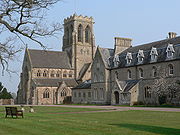 |
Belmont Abbey Belmont Abbey, Herefordshire Belmont Abbey, in Herefordshire, England is a Catholic Benedictine monastery that forms part of the English Benedictine Congregation. It stands on a small hill overlooking the city of Hereford to the east, with views across to the Black Mountains, Wales to the west... Abbey Church of St Michael and All Angels |
1859–1920 | |
| Roman Catholic pro-cathedral, (now Belmont Abbey) see translated to St David’s Metropolitan Cathedral Cardiff |
52.03932°N 2.756412°W http://www.belmontabbey.org.uk/ | ||
| Beverley Church of St John of Beverley |
1846–1878 | ||
| Roman Catholic Diocese of Beverley split in 1878 into Diocese of Leeds and Diocese of Middlesbrough, church located in North Bar Without | |||
 |
Clifton Pro-Cathedral of the Holy Apostles |
1850–1973 | |
| Roman Catholic pro-cathedral replaced by Clifton Cathedral Clifton Cathedral The Cathedral Church of SS. Peter and Paul is the Roman Catholic cathedral in the English city of Bristol. Located in the Clifton area of the city, it is the seat of the Diocese of Clifton and is known as Clifton Cathedral.... now closed |
51.456297°N 2.609720°W | ||
 |
Southwark pro-cathedral Archbishop Amigo Jubilee Hall, Southwark |
||
| served as pro-cathedral during the rebuilding of the adjacent cathedral following destruction during World War II World War II World War II, or the Second World War , was a global conflict lasting from 1939 to 1945, involving most of the world's nations—including all of the great powers—eventually forming two opposing military alliances: the Allies and the Axis... |
51.456297°N 2.609720°W | ||
Church of Scotland
| Establishment | | Image | | Dedication | | Established | | Notes/provenance | | Location and website |
|---|---|---|---|---|---|
| Aberdeen | 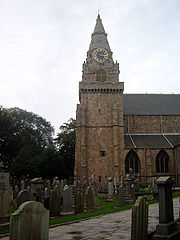 |
St Machar | translated from Mortlach c. 1131 | 57.169700°N 2.102069°W | |
| Birnie Birnie Kirk Birnie Kirk is a Church of Scotland church situated 4 km south of Elgin, in Moray, northeast Scotland. The church was built c. 1140 and became the first cathedral of the Bishop of Moray. It remained the cathedral church until 1184 when Bishop Simon de Tosny died. His successor Richard de... |
 |
St Brendan | |||
| Brechin Brechin Brechin is a former royal burgh in Angus, Scotland. Traditionally Brechin is often described as a city because of its cathedral and its status as the seat of a pre-Reformation Roman Catholic diocese , but that status has not been officially recognised in the modern era... |
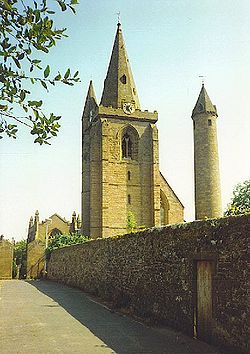 |
The Holy Trinity | ante 1150 | on the site of a former Culdee Culdee Céli Dé or Culdees were originally members of ascetic Christian monastic and eremitical communities of Ireland, Scotland and England in the Middle Ages. The term is used of St. John the Apostle, of a missioner from abroad recorded in the Annals of the Four Masters at the year 806, and of Óengus... monastery |
56.730694°N 2.662125°W |
| Dunblane Dunblane Cathedral Dunblane Cathedral is the larger of the two Church of Scotland parish churches serving Dunblane, near the city of Stirling, in central Scotland.-History:... |
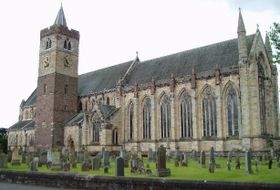 |
St Blane | 56.189550°N 3.964949°W | ||
| Dornoch Dornoch Cathedral Dornoch Cathedral is a parish church in the Church of Scotland, serving the small Sutherland town of Dornoch, in the Scottish Highlands. It was built in the 13th century, in the reign of King Alexander II and the episcopate of Gilbert de Moravia as the cathedral church of the diocese of... |
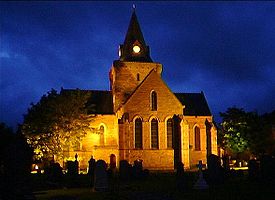 |
St Mary | 1224 | 57.880729°N 4.030695°W | |
| Dunkeld Dunkeld Cathedral Dunkeld Cathedral stands on the north bank of the River Tay in Dunkeld, Perth and Kinross, Scotland. Built in square-stone style of predominantly grey sandstone, the cathedral proper was begun in 1260 and completed in 1501... |
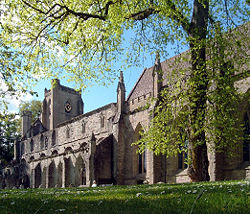 |
St Columba | 1120 | abbey 815 | |
| Edinburgh | 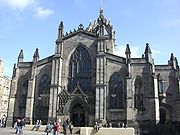 |
St Giles | 55.949524°N 3.190928°W | ||
| Glasgow St. Mungo's Cathedral, Glasgow Glasgow Cathedral, also called the High Kirk of Glasgow or St Kentigern's or St Mungo's Cathedral, is today a gathering of the Church of Scotland in Glasgow.... |
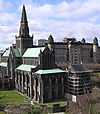 |
St Mungo (or St Kentigern) | 1123 | 55.862966°N 4.234436°W | |
| Iona Iona Abbey Iona Abbey is located on the Isle of Iona, just off the Isle of Mull on the West Coast of Scotland. It is one of the oldest and most important religious centres in Western Europe. The abbey was a focal point for the spread of Christianity throughout Scotland and marks the foundation of a monastic... |
 |
St Mary | monastery 563 currently used for worship by the Iona Community Iona Community The Iona Community, founded in 1938 by the Rev George MacLeod, is an ecumenical Christian community of men and women from different walks of life and different traditions in the Christian church.... |
56.326127°N 6.400438°W | |
| Kirkwall St. Magnus' Cathedral, Kirkwall St. Magnus Cathedral, Kirkwall dominates the skyline of Kirkwall, the main town of Orkney, a group of islands off the north coast of mainland Scotland. It is the most northerly cathedral in the British Isles, a fine example of Romanesque architecture built for the bishops of Orkney when the... |
 |
St Magnus | 1137 | part of the archbishopric of Trondhiem, Norway Norway Norway , officially the Kingdom of Norway, is a Nordic unitary constitutional monarchy whose territory comprises the western portion of the Scandinavian Peninsula, Jan Mayen, and the Arctic archipelago of Svalbard and Bouvet Island. Norway has a total area of and a population of about 4.9 million... , 1137–1472 |
|
| Lismore St Moluags Cathedral, Lismore "Lismore Cathedral" redirects here. For the Church of Ireland cathedral, see Lismore Cathedral, Ireland.St. Moluag's Cathedral is located on the Scottish island of Lismore just off the coast of Oban.... |
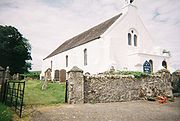 |
St Moluag | |||
Roman Catholic Church
Former Roman Catholic Cathedrals of the Province of St. Andrews and Edinburgh| Establishment | | Image | | Dedication | | Established | | Notes/provenance | | Location and website |
|---|---|---|---|---|---|
| Dumfries | St Andrew | to May 1961 | located in Shakespeare Street, destroyed by fire translated to Ayr 1962 |
||
| Ayr Good Shepherd Cathedral, Ayr The Good Shepherd Cathedral in Ayr, South Ayrshire, Scotland was the cathedral church of the Roman Catholic Galloway Diocese.- History :The Church of the Good Shepherd was opened in 1957, to serve the communities of Whitletts, Dalmilling, Lochside and Braehead areas of Ayr. Before the church was... |
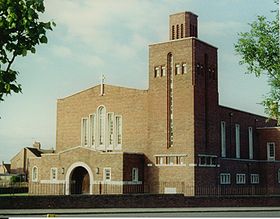 |
Good Shepherd Good Shepherd Cathedral, Ayr The Good Shepherd Cathedral in Ayr, South Ayrshire, Scotland was the cathedral church of the Roman Catholic Galloway Diocese.- History :The Church of the Good Shepherd was opened in 1957, to serve the communities of Whitletts, Dalmilling, Lochside and Braehead areas of Ayr. Before the church was... |
1957–2007 | translated from Dumfries closed in 2007 Transferred to St Margaret's, Ayr |
55.469842°N 4.599087°W |
Former cathedrals (disused)
| Establishment | | Image | | Dedication | | Established | | Notes/provenance | | Location and website |
|---|---|---|---|---|---|
| Abercorn Abercorn Abercorn is a village and parish in West Lothian, Scotland. Close to the south coast of the Firth of Forth, the village is around west of South Queensferry.-History:... |
St Wilfred | c. 680 | monastery established mid 7th century now the site of the kirk Kirk Kirk can mean "church" in general or the Church of Scotland in particular. Many place names and personal names are also derived from it.-Basic meaning and etymology:... |
||
| Abernethy | 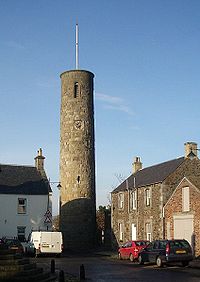 |
St Brigid | possible seat of bishop in eighth century | ||
| Birsay Birsay Birsay is a parish in the north west corner of The Mainland of Orkney, Scotland. Almost all the land in the parish is devoted to agriculture: chiefly grassland used to rear beef cattle... |
Christ Church | ante 1035 | location unknown; possibly on the Brough of Birsay Brough of Birsay - Lighthouse :An unmanned lighthouse on the Brough was built in 1925 by David A Stevenson.-References:... |
||
| Dunfermline Dunfermline Abbey Dunfermline Abbey is as a Church of Scotland Parish Church located in Dunfermline, Fife, Scotland. In 2002 the congregation had 806 members. The minister is the Reverend Alastair Jessamine... |
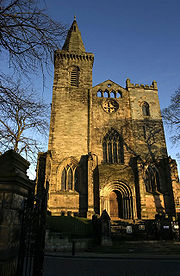 |
now in the care of Historic Scotland Historic Scotland Historic Scotland is an executive agency of the Scottish Government, responsible for historic monuments in Scotland.-Role:As its website states:... |
|||
| Egilsay Egilsay Egilsay is one of the Orkney Islands in Scotland, lying east of Rousay. The island is largely farmland and is known for its corncrakes.-St. Magnus Church:... |
St Magnus | ||||
| Elgin Elgin Cathedral Elgin Cathedral, dedicated to the Holy Trinity, sometimes referred to as The Lantern of the North is a historic ruin in Elgin, Moray, north-east Scotland. It was established in 1224 on an area of ground granted by Alexander II that was close to the River Lossie and outside of the burgh of... |
The Holy Trinity | 1224 | ruins in care of Historic Scotland Historic Scotland Historic Scotland is an executive agency of the Scottish Government, responsible for historic monuments in Scotland.-Role:As its website states:... known as The Lantern of the North |
||
| Fortrose Fortrose Fortrose is a burgh in the Scottish Highlands, located on the Moray Firth, approximately ten kilometres north east of Inverness. The town is known for its ruined 13th century cathedral, and as the home of the Brahan Seer. In the Middle Ages it was the seat of the bishopric of Ross... |
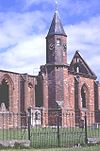 |
St Peter and St Boniface | 13th century | ruins in care of Historic Scotland Historic Scotland Historic Scotland is an executive agency of the Scottish Government, responsible for historic monuments in Scotland.-Role:As its website states:... |
|
| Halkirk Halkirk Halkirk is a village on the River Thurso in Caithness, in the Highland council area of Scotland. From Halkirk the B874 road runs towards Thurso in the north and towards Georgemas in the east... |
11th century | translated to Dornoch 1222 | |||
| Kingarth Kingarth Kingarth is a historic village and parish on the Isle of Bute, off the coast of south-western Scotland. In the Early Middle Ages it was the site of a monastery and bishopric and the cult centre of Saints Cathan and Bláán .... |
St Blane | care of Historic Scotland Historic Scotland Historic Scotland is an executive agency of the Scottish Government, responsible for historic monuments in Scotland.-Role:As its website states:... |
|||
| Kinneddar | |||||
| Kilrimont | 9th century | abbey 8th century | |||
| Mortlach | St Molouc | to 1131 | translated to Aberdeen 1131 | ||
| Rosemarkie Rosemarkie Rosemarkie is a village on the south coast of the Black Isle peninsula in northern Scotland.-Geography:Rosemarkie lies a quarter of a mile east of the town of Fortrose... |
12th century | translated to Fortrose in 13th century | |||
| St Andrews | 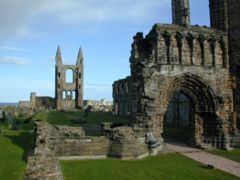 |
St Andrew | 908 | archbishopric 1472 ruins in the care of Historic Scotland Historic Scotland Historic Scotland is an executive agency of the Scottish Government, responsible for historic monuments in Scotland.-Role:As its website states:... |
56.342138°N 2.791386°W |
| Skeabost Snizort Cathedral Snizort Cathedral, was a small cathedral church located on an island in the River Snizort, near the mouth of Loch Snizort on the Scottish island of Skye. Also referred to as Church of St Columba or Skeabost, it was founded under the authority of the Archbishop of Nidaros in Norway... (Snizort) |
St Columba Columba Saint Columba —also known as Colum Cille , Colm Cille , Calum Cille and Kolban or Kolbjørn —was a Gaelic Irish missionary monk who propagated Christianity among the Picts during the Early Medieval Period... |
15th century | translated to Iona | ||
| Spynie Spynie Palace Spynie Palace, also known as Spynie Castle, was the fortified seat of the Bishops of Moray for about 500 years. The founding of the palace dates back to the late 12th Century. It is situated about 500m from the location of the first officially settled Cathedral Church of the Diocese of Moray, in... |
 |
The Holy Trinity | 1207/8 | translated to Elgin 1224 a parish church 1224–1736 |
|
| Whithorn Whithorn Priory Whithorn Priory is located in Wigtownshire, Galloway. It was founded about the middle of the twelfth century, in the reign of David I, by Fergus, Lord of Galloway, with Gille Aldan, Bishop of Galloway, for Premonstratensian Canons, referred colloquially in Britain as the White Canons.The canons of... |
St Martin of Tours | 5th century | ruins in care of Historic Scotland Historic Scotland Historic Scotland is an executive agency of the Scottish Government, responsible for historic monuments in Scotland.-Role:As its website states:... known as the Candida Casa ("White House") |
||
Wales
| Establishment | | Image | | Dedication | | Established | | Notes/provenance | | Location and website |
|---|---|---|---|---|---|
| Denbigh Denbigh Denbigh is a market town and community in Denbighshire, Wales. Before 1888, it was the county town of Denbighshire. Denbigh lies 8 miles to the north west of Ruthin and to the south of St Asaph. It is about 13 miles from the seaside resort of Rhyl. The town grew around the glove-making industry... |
to 1539 | Earl of Leicester's Robert Dudley, 1st Earl of Leicester Robert Dudley, 1st Earl of Leicester, KG was an English nobleman and the favourite and close friend of Elizabeth I from her first year on the throne until his death... church intended as a cathedral to replace St Asaph, but now an unfinished ruin on the walls of Denbigh Castle Denbigh Castle Denbigh Castle was a fortress built following the 13th-century conquest of Wales by Edward I.The castle, which stands on a rocky promontory above the Welsh market town of Denbigh, Denbighshire, was built upon an earlier Welsh stronghold. It was defended by a unique triple-towered gateway.A planned... |
53.1823079°N 3.4192184°W | ||
| Rhuddlan Rhuddlan Rhuddlan is a town and community in the county of Denbighshire , in north Wales. It is situated to the south of the coastal town of Rhyl and overlooks the River Clwyd. The town gave its name to the Welsh district of Rhuddlan from 1974 to 1996... |
c. 1400 | site mooted for replacement to St Asaph Saint Asaph Saint Asaph was, in the second half of the 6th century, the first or second Bishop of St Asaph, i.e. bishop of the diocese of Saint Asaph, the Welsh See now of that name.-Biography:... following its sacking by Owain Glyndŵr Owain Glyndwr Owain Glyndŵr , or Owain Glyn Dŵr, anglicised by William Shakespeare as Owen Glendower , was a Welsh ruler and the last native Welshman to hold the title Prince of Wales... , probably within the curtiledge of Rhuddlan Castle Rhuddlan Castle Rhuddlan Castle is a castle located in Rhuddlan, Denbighshire, Wales. It was erected by Edward I in 1277 following the First Welsh War.-Construction:Rhuddlan was planned as a concentric castle... |
|||

